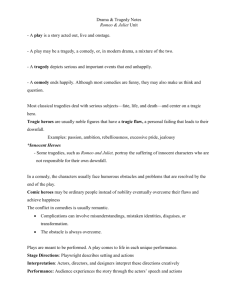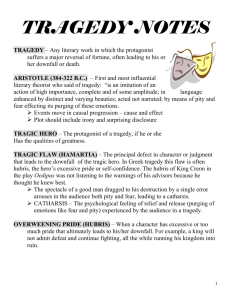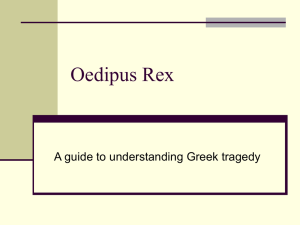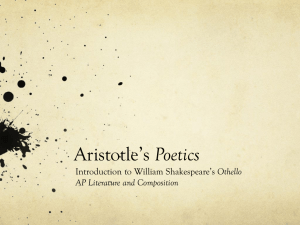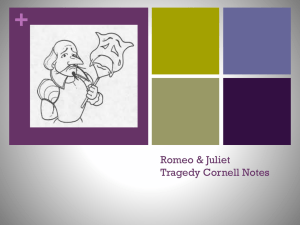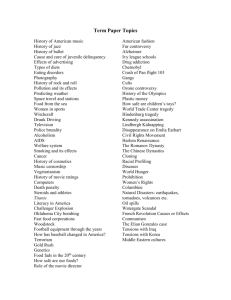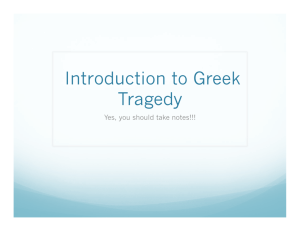Tragedy Project
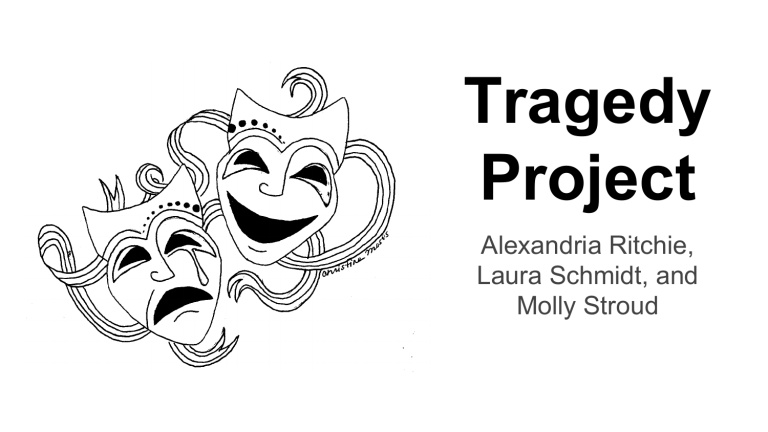
Tragedy
Project
Alexandria Ritchie,
Laura Schmidt, and
Molly Stroud
Origin of Tragedy: Tragos
● The word tragos means “goat” and is part of the etymology of the word “tragedy.”
● The other part of the etymology is the
Greek ode, meaning “hymn” or
“lamentation.”
● In ancient Greece, worshippers sacrificed goats to the god Dionysus during festivals.
● A song of lamentation would then be sung for the sacrificed goat.
● Tragos and ode came together to form tragedy.
● The original tragedy, therefore, was the death of a goat.
Origin of Tragedy: Dionysus
Dionysus , born from the thigh of Zeus, was the
Greek god of fertility, wine, and theater.
● Dionysus is credited as an origin of tragedy, as there are obvious links between the two (goat sacrificing (tragos), song rituals (tragoedia), and wearing masks.
● When drunk, people act as someone other than themselves, hence the ability to act. Dionysus, the god of wine, also became the god of theater for that
● A choral lyric called the dithyramb (honoring
Dionysus), sung by a group of men dressed as satyrs, is thought to be the start of tragedy.
● When instruments were thrown into the mix, the aulos (a double pipe associated with Dionysus) was often used.
Origin of Tragedy: City Dionysia
● A festival held to celebrate the end of winter and the harvest
● On the first day, people marched to the Theatre of Dionysus
● The first tragedy performed at the
Dionysia was by Thespis, who was awarded a goat (a common symbol of
Dionysus)
● This was the origin of the word tragedy, which means “goat-song”
● Five days of each Dionysia were devoted to performances, at least three of which were always tragedies.
Origin of Tragedy: the trilogy
● In early competitions such as the
Dionysia, playwrights displayed four plays, generally three tragedies and one satyr play.
● It became customary to write tragedies in groups of three, or trilogies.
● Aeschylus, one of the first great tragic writers, popularized trilogy writing by carrying on a single theme through his three tragedies.
● Later, Sophocles perfected the art of trilogy writing in plays such as Oedipus
Rex and Antigone.
Origin of Tragedy: The Satyr Play
● During the Dionysia festival (as aforementioned), there were usually four plays, three of which were tragedies. Though the one play that was not a tragedy may have been a Greek form of a tragicomedy called a satyr play.
● Satyr plays were used as comic relief, sometimes an interlude between tragic plays, but they also could appear at the very end of the trilogies.
● Actors dressed as satyrs ran around the stage bringing joy to the audience by being sexually explicit (philliac props, the usual), faux drunkenness, pranks, and jokes.
● While satyr plays were set up like tragedies in means of the seriousness of character and costume, the chorus of satyrs in the play made fun of tragedy characters with their foolishness and raunchiness.
The Form of Tragedy: The Players
● In Ancient Greece, males played all roles, and when necessary, dressed as women
● Greek plays were known for their iconic masks, which actors wore to allow their faces to be seen from a distance and also to allow one man to play multiple characters
● Actors wore beautified versions of everyday clothing, such as tunics
● The chorus often dressed identically to create a sense of unity
The Form of Tragedy: Scene Order
● Greek tragedies had three main parts: prose, lyrics, and dancing.
● They began with the prologue, which helped the audience understand any background information necessary to the tragedy’s plot.
● Then, the chorus would enter in the parados, singing an ode.
● From there, the first episode would take place.
● Episodes (prose) and stassima in which the chorus sang would then alternate for the rest of the play.
● At the end of the play, the chorus would sing the exodus and leave the orchestra.
The Form of Tragedy: Topics
● Recurring topics in tragedies are that the tragic hero must: be noble, possess a tragic flaw, have free will, come to realize why they’ve met their fate, and ultimately be pitied by the audience.
Examples: Oedipus, Macbeth, Hamlet.
● Nobility : must be of noble stature, or considered a great man. Take Oedipus or Macbeth for example.
● Tragic Flaw/Tragic Error : the tragic hero could possess an excessive amount of pride (hubris), could be negligent, too trusting. They could also make a fatal error, possibly prompted by their tragic flaw.
● Free will : The tragic hero must come to their demise on their own terms, usually by means of their tragic flaw or error.
● Anagnorisis : The tragic hero comes to realize where/how everything went wrong.
● Audience Reaction : The tragic hero must elicit empathy from the viewers, as his struggles are real and human.
The Form of Tragedy: The Theater
● Theaters were large, open-air constructions
● They were built on the slopes of hills for their terraced seating and were made of three parts a.
The orchestra - the center of the theater where the actual performance took place b.
The skene - the backstage building where actors changed their costumes c.
The theatron - the terraced rows of benches where the audience sat to watch
■ Some theaters could hold up to fourteen thousand people
The Aristotelian Model of Tragedy
● According to Aristotle, an ancient Greek writer and philosopher, tragedy depicts the downfall of a noble hero or heroine.
● This was the tragic hero.
● Generally, the downfall would occur through a combination of hubris, fate, or the will of the Gods.
● Aristotle stated that the tragic hero would generally have some sort of fatal flaw or make a fatal mistake
(hamartia).
● Aristotle also identified six elements of tragedy: plot, characters, verbal expression, thought, visual adornment, and composition. Of these, however, only plot truly distinguishes tragedy from other types of literature.
● Aristotle proclaimed Sophocles’ Oedipus Rex to be the perfect tragedy.
Peripeteia
Peripeteia : “a sudden or unexpected reversal of circumstances, especially in a literary work.”
-Merriam-Webster
● An example of this would be when in the play Macbeth , Macbeth realizes he has done a wrong after he has already committed the crime e.g., leaving
Duncan’s chamber after he murdered him, and then after sending the murderers to kill Banquo and Fleance.
● Aristotle describes it as “the most powerful part of a plot in a tragedy along with discovery (anagnorisis)”.
Anagnorisis
“ Anagnorisis: (Greek: “recognition”), in a literary work, the startling discovery that produces a change from ignorance to knowledge.”
- Encyclopædia Britannica
● Example: When Oedipus learned that he had fulfilled the prophecy of killing his father and marrying his mother
● Aristotle, the first person to discuss anagnorisis, said that a tragedy that included it showed that the tragedy was very high quality with a complex plot.
Hubris
● In Greek tragedy, one of the biggest ways for a tragic character to experience his or her downfall is through hubris.
● Hubris is extreme pride or arrogance. A character demonstrating hubris thinks that he or she is better than everyone else.
● Hubris has its origins in ancient Greek mythology, in which it is depicted as a great crime.
● It was designed to give a moral lesson to viewers, demonstrating that if they too had hubris, similar tragic things would happen to them.
Hamartia
“Tragic Error”
● Sometimes called a tragic error or a fatal flaw, hamartia ultimately leads to the downfall of the tragic hero.
● Some examples of a tragic error could be: poor judgement, ignorance, or a character flaw.
● In Oedipus Rex , Oedipus’ fatal error was pursuing and threatening to kill his father’s murderer, which happened to be himself, which resulted in him committing patricide and incest, just as the prophecy foretold.
● “Hamartia” derives from the Greek word hamartanein “to err”, or to miss. Often visualized as either missing the bullseye with an arrow or missing the mark with a javelin.
Catharsis
“Catharsis: the act or process of releasing a strong emotion (such as pity or fear) especially by expressing it in an art form.”
- Merriam-Webster
● A Greek word meaning “cleansing”, catharsis in literature is generally when a character’s emotions are “cleansed”
● Catharsis often provokes strong emotional reactions from the audience by causing them to connect the character’s emotions to ones that they themselves have felt
Modern Tragedies
● Tragedies are still popular today, however the definition of what a tragedy is has become much more open-ended and does not usually conform to the classical idea of what a tragedy is
● Greek and Shakespearean tragedies, such as Oedipus the King and Macbeth, are the most well-known and are often read in school
● Similar in length (and amount of tragedy) to the five day long Dionysia festival, the public school system is an example modern tragedy.
Sources
https://greektheatre.wordpress.com/home/ http://artsedge.kennedy-center.org/interactives/greece/theater/playersProps.html
http://www.didaskalia.net/issues/vol4no1/bleisch.html
http://www.ancientgreece.com/s/Theatre/ http://www2.cnr.edu/home/bmcmanus/tragedy_theater.html
http://primal-page.com/cathar.htm
http://www.ancient.eu/Greek_Tragedy/ http://www.ohio.edu/people/hartleyg/ref/aristotletragedy.html
http://literarydevices.net/hubris/

